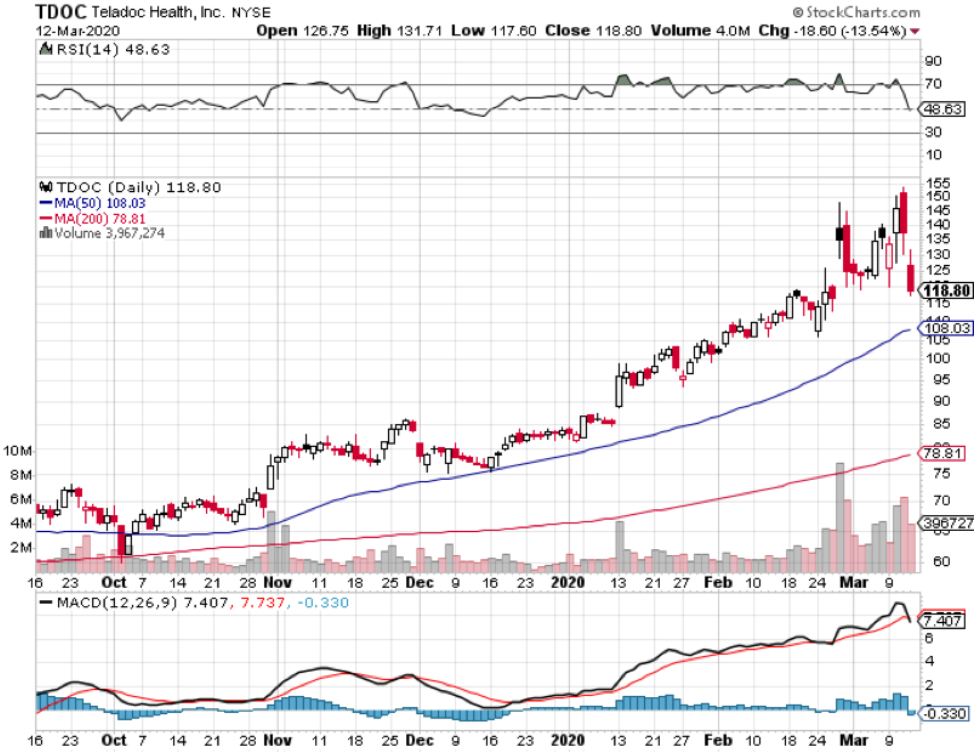Here's Another Tech Corona Play
Here is a great health-tech name for you that is up 10% in the past 30 days – Teladoc Health, Inc. (TDOC).
The fallout from the coronavirus has been brutal and we will see the first round of bankruptcies in a few weeks for companies who get hit with that debt service payment tsunami.
The Nasdaq is now down almost 30% in just 3 weeks and I can proudly say that the tech letter avoided the bulk of the carnage.
But aside from the fallout, the pandemic has underscored the desperate societal need and use case for health tech.
The unpreparedness of the U.S. administration has been cringeworthy, to say the least, essentially pigeonholing the virus as a non-American issue or an unreliable media ruse.
The consequences are a government and society bereft of a real health solution, not to mention testing kits.
Our policymakers are reeling.
As the administration has found out, this is not something that a 50-basis rate cut can solve.
Exposing the holes in our health system isn’t fun to do but this is where the use case for technology cross-pollinating with healthcare to create products and services to buttress these types of health scares comes into play.
Seeking alternatives to face-to-face health solutions is becoming a pressing issue.
Remote diagnoses through telehealth services could become an important tool, although physical testing for the virus would have to be done in person.
Influenza pandemics are the perfect environment to enlist services from these types of telehealth services that could disseminate important and crucial guidance and consultation to sick patients.
Especially in the initial screening process of judging whether patients’ needs - immediate action or not - could improve the efficiency of hospitals and clinics.
At the outset of the virus spread, many clinics globally were refusing to test potential sick people because the doctors themselves did not want to take the risk of getting sick.
The lack of ICU hospital beds in the U.S. has been highlighted as an Achilles heel and reducing the numbers of hospital visitors by categorizing them into different need-based groups would help the healthcare professional community on the ground.
We have been swamped by images from Wuhan, China of nurses and doctors being overworked and overwhelmed to sometimes death.
That must be avoided in the future.
Virtual patient traffic at privately held telehealth company American Well has risen about 11% since the first U.S. coronavirus death and an infusion of demand has been recorded at similar companies as well.
If it’s just the basic knowledge of whether going to the supermarket is safe or not or if flying on an airplane or not is feasible, people need to know.
Knowledge is power and knowledge is safety.
Some might get nervous about early viral symptoms and some might seek more information on how to stay safe.
Brad Younggren, Chief Medical Officer of 98point6, offering private text-based diagnosis and treatment via a mobile app, said their physicians were encouraging patients diagnosed with influenza to communicate if they do not improve.
Teladoc said it has been partnering with the Centers for Disease Control and Prevention (CDC) to provide near real-time surveillance data on the spread of the virus.
An $8.3 billion U.S. bill signed into law on Friday to fund the coronavirus outbreak response includes $500 million to waive certain restrictions on Medicare telehealth coverage. That provision is aimed at encouraging senior citizens to choose at-home virtual healthcare services.
Analyzing the tech markets today – they are showing signs of extreme stress.
Tech stocks have been utterly decoupled from fundamentals as the radioactive waste effect from the health scare floors any inkling of optimistic sentiment.
The drawdowns have been heavy which validates the tech letter going 100% cash for the short-term.
The policy missteps have added more turbulence to an already sensitive situation akin to lighting a match and throwing it into the tinder box.
What started out as an exogenous event has morphed into a broad set of externalities crushing whole industries such as travel, energy, banks, airlines, hospitality, and hotels.
Dealing with an oil crisis, health crisis, and interest rate crisis doesn’t just work itself through in a matter of days and tech companies are being repriced accordingly.
Teledoc is one of those companies to keep in mind once the chaos blows over.


